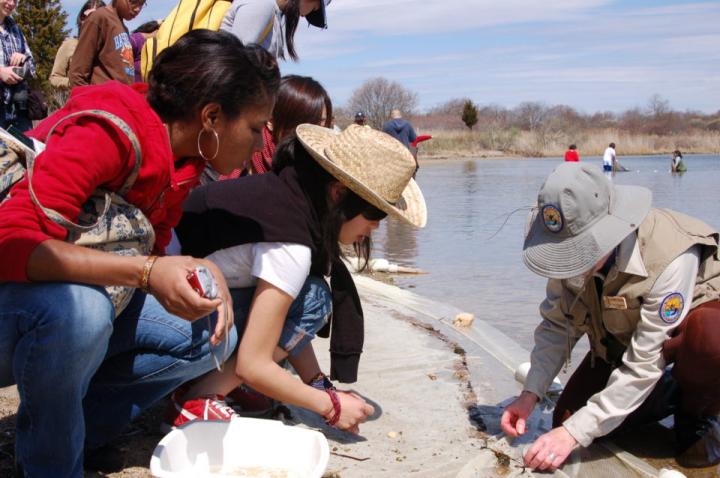A blueprint for how to educate people to maximize their impact

Credit: U. S. Fish & Wildlife Service
If you like to walk in the woods, raft a river, dig in a garden or look at butterflies, you could become an agent of change.
Science and policy may not be enough to solve complex environmental challenges ranging from species extinction to water pollution, but actively engaged citizens could tip the balance, according to a new Stanford-led study that provides a blueprint for empowering people to turn the tide of environmental destruction. In Biological Conservation, the researchers outline four key facets of programs that have been successful in motivating and training people to have a meaningful impact.
“Effective environmental education moves people to persistent action through engaging with issues in relevant ways,” said study lead author Nicole Ardoin, an associate professor at the Stanford Graduate School of Education and a senior fellow at the Stanford Woods Institute for the Environment. “Without it, making sustained change on environmental and sustainability issues simply is not possible.”
While the rate of climate change and species extinction intensifies, the U.S. outdoor recreation sector is growing more than one-and-a-half-times faster than the overall economy. Historic federal legislation passed earlier this year is opening more than a million acres of wildlands to public access. Increasingly, nonprofit groups and government agencies are harnessing this growing interest in nature as a force for conserving it. The question for them has been what kinds of activities or educational engagement have the most measurable impact.
To get at that question, the researchers analyzed reviews of more than 100 environmental education programs that addressed topics such as habitat protection and restoration, water quality, energy conservation, climate change and recycling. From this, the researchers gleaned four keys to maximizing the chance that programs will help citizens make meaningful environmental impacts: focus on locally relevant issues; collaborate with experts; incorporate action-oriented learning strategies and approaches, such as hands-on experiments and policy recommendations; and measure outcomes.
The researchers point to citizen science as an example of the four principles at work. At its best, citizen science involves members of the general public participating in aspects of science initiatives from design to implementation. Their hands-on engagement in the conservation effort yields reliable, usable data. These initiatives provide community members with avenues for collecting and measuring local-scale data, working directly with scientists and research managers on relevant research and documenting outcomes.
Incorporating the study’s findings into new environmental education programs could help more conservation organizations and agencies involve the public effectively in improving environmental quality. It could also help cyclists, river rafters, hikers and others contribute directly to the nature they enjoy.
Environmental education: Keys to success
- 1) Focus on local environmental issues or locally relevant dimensions of global issues
Example: Students in a reforestation project created nurseries, improved their abilities to serve as custodians, and participated in plantings on school grounds, as well as in other deforested parts of the community, with the goal of reconnecting with local ecosystems and enhancing student capabilities to serve as custodians.
2) Collaborate with scientists and resource managers
Example: A program brought together prison inmates with scientists, students and natural area managers to encourage lifelong learning, support ecological research and promote habitat restoration through plant production and captive rearing of animals in correctional facilities. Conservation practitioners provided the knowledge that resulted in raising and releasing approximately 550 frogs, 4,000 butterflies and 1 million plants.
3) Incorporate action elements into programs
Example: University students’ sea turtle research and habitat assessment resulted in a proposal to the Mexican government for a marine protected area, with recommendations for fishing activity zones for resource and ecotourism uses.
4) Measure and report program outcomes
Example: Researchers in a reforestation education initiative reported not only the number of trees planted but also provided data on the survival rates of planted trees.
###
Study co-authors include researchers from Virginia Tech and 4Research. The North American Association for Environmental Education funded the research through its eeWORKS initiative, a collaboration among nonprofit organizations and government agencies.
Ardoin is also director of the Emmett Interdisciplinary Program in Environment and Resources (E-IPER) in the School of Earth, Energy & Environmental Sciences (Stanford Earth).
Media Contact
Rob Jordan
[email protected]
415-760-8058
Original Source
https:/




